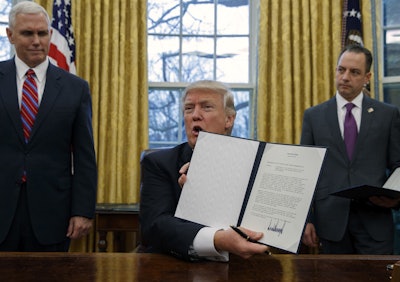
President Donald Trump followed through with a campaign promise this week and pulled the U.S. from the Trans-Pacific Partnership.
The pact created more stringent trade rules with 11 other countries in the Pacific region including Japan, Vietnam and Malaysia.
Opponents of the deal have argued that it favors corporations ahead of public interests. But supporters of TPP said it would create needed rules for environmental protections, labor and intellectual property. It was also designed to give the U.S. more clout in the region and balance China’s power.
The American Chemistry Council has been strongly supportive of the deal, saying that “future economic growth for the chemical sector depends on establishing trade policies that ensure a strengthened competitive position.”
Billions of dollars in trade potential was on the line for the chemicals industry. According to estimates by the International Trade Administration, TPP would have allowed the American chemicals industry to tap into a $7 billion market in Japan, a $928 million market in Malaysia, a $465 million market in Vietnam and millions more in the other countries.
In lieu of far-reaching deals like TPP, President Trump has expressed interest in striking one-on-one agreements with individual countries.
President Trump also asked Dow Chemical CEO, Andrew Liveris, who is now the head of the American Manufacturing Council, to work with leaders from other major companies like Dell, Ford and Tesla to come up with a plan within 30 days to stimulate manufacturing in the US.
Fortune reports that after meeting with President Trump, Liveris said that the two discussed a border tax and whether that would hurt the industry.
"Look: I would take the president at his word here. He's not going to do anything to harm competitiveness. He's going to actually make us all more competitive," Liveris said.






















